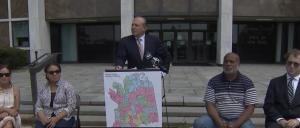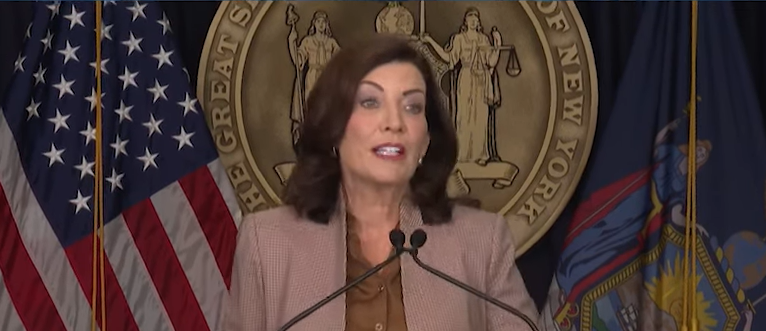Photos: YouTube Screenshots
NASSAU COUNTY, NY – Thursday, the New York Civil Liberties Union, the American Civil Liberties Union, LatinoJustice PRLDEF, the Asian American Legal Defense and Education Fund, and Steptoe LLP sent a letter to the Nassau County Legislature providing formal notice that their redistricting plan violates the John R. Lewis Voting Rights Act of New York (NYVRA) by diluting the voting strength and political influence of Black, Latino, and Asian residents.

As required under the NYVRA, this statutory notice starts a 50-day clock for the Legislature to fix its violations voluntarily, before facing what would be the first redistricting legal challenge brought under a state voting rights act.
“With 2024 around the corner, nationwide efforts to diminish the political power of communities of color and chisel away at legal protections for their voting rights are surging,” said Perry Grossman, Director of the Voting Rights Project at the New York Civil Liberties Union. “We’re using all the tools and protections we secured in the NYVRA to ensure voters of color aren’t wrongfully denied a fair opportunity to have their voices heard at the ballot box.”
“So-called ‘race-blind maps’ that ignore a community’s diversity are not just unlawful, they often dilute the votes of people of color,” said Adriel I. Cepeda Derieux, Deputy Director of the ACLU’s Voting Rights Project. “By law, map drawers must ensure that communities of color are accurately reflected. Nassau County is one of the most diverse in the state, yet the map appears to deny Black, Latino, and Asian voters the opportunity to elect candidates of their choice. We urge the Legislature to remedy this ahead of a critical election year.”
“Fair voting maps are critical to ensuring government works for all citizens,” said Michael Scavelli, Jason Abel, and Evan Glassman of Steptoe LLP. “The Steptoe team is proud to stand with our clients and co-counsel in ensuring fair representation for all voters across Nassau County.”
“LatinoJustice and our partners fought hard to win voter rights protections in New York State with the John R. Lewis Voting Rights Act of New York,” said Fulvia Vargas‑De Leon, LatinoJustice Senior Counsel. “Now, we’re holding the Nassau County Legislature accountable to this historic law ahead of critical 2024 elections. With voting rights for Latino, Black, and Asian Americans under constant attack across the country, it’s more important than ever to uphold the protections we’ve won here in New York State. We call on the Nassau Legislature to remedy this harm and prevent further disenfranchisement of communities of color in Nassau County.”

Though residents of color make up over one-third of Nassau County’s eligible voters, the current map — which the Legislature drew behind closed doors with minimal public transparency — only creates 4 districts out of 19 where Black, Latino, and Asian residents constitute a majority of eligible voters. This includes “cracking and packing” communities of color in places such as Lakeview, Freeport, Inwood, South Valley Stream, Elmont, and New Hyde Park.
The Asian population also rose over 60 percent between 2010 and 2020 in Nassau County, but the map unnecessarily divides this large and fast-growing community, denying Asian voters the opportunity to influence the outcome of elections.
“Despite massive growth in population, the Asian American community in Greater New Hyde Park is divided among several legislative districts, making it virtually impossible for Asian Americans to have a voice in the Nassau County Legislature,” said Ronak Patel, Equal Justice Works fellow at the Asian American Legal Defense and Education Fund. “This map divides, marginalizes, and disenfranchises Asian, as well as Latino and Black, communities across the County in clear violation of the NYVRA and its strong protection of minority influence.”
A more representative map would include at least six districts where Black, Latino, and Asian residents constitute a majority of the citizen voting-age population, as well as a district that prevents the dilution of Asian voting influence.








